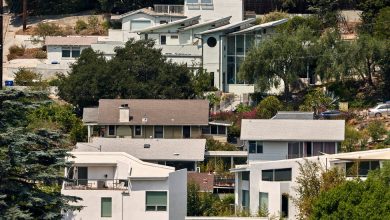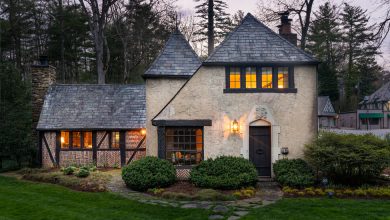House Hunting in Israel: An Inventive Use of Concrete Outside of Tel Aviv

A Sleek Five-Bedroom House Near Israel’s Coast
$3.85 MILLION (12 MILLION ISRAELI SHEKELS)
Cast in concrete with wood, glass and aluminum accents, this five-bedroom house just south of Tel Aviv, in central Israel, was designed by modernist architects Israelevitz for an Israeli cement-company executive and his family.
The 3,885-square-foothome, resembling a trio of stacked rectangles, also serves as a showcase for a concrete formulation developed by its owner, Itzik Gelerenter. “It includes chemical additives that improve its impermeability, prevent cracking, and eliminate air bubbles on the surface,” Mr. Gelerenter said. “The architects were surprised and very happy to design a house that was primarily concrete, which is a little extreme.”
It is one of 200 homes in Irus, a 71-acre gated residential community established in 2013 in the Gan Raveh regional council, about 14 miles south of Tel Aviv and 35 miles northwest of Jerusalem, on Israel’s Mediterranean coast. Plans call for Irus to grow to 450 homes, said Avraham Monarov of Israel Sotheby’s International Realty, the listing agent, who called this house “modern-minimalist, luxurious, and completely unique for this area.”

The 3,885-square-foot house is one of 200 homes in Irus, a 71-acre residential community established in 2013 in the Gan Raveh regional council, about 14 miles south of Tel Aviv.Credit…Courtesy of Israel Sotheby’s International Realty
The ground level features smooth concrete floors and textured concrete walls, which recur throughout. A sprawling great room with 13-foot ceilings encompasses the living room, dining area and kitchen. A large black island anchors the kitchen, whose Bosch oven and DeLonghi refrigerator are concealed behind pressed-wood panels. Walls of glass connect the great room to a tiered concrete outdoor deck and an in-ground pool, all surrounded by a low concrete wall. At the other end of the great room, floor-to-ceiling wood panels in contrasting hues create dramatic backdrops for sleek furnishings in black fabric and blond wood.
Set behind the kitchen, the primary suite is the only bedroom on the ground floor. Like all of the bedrooms, it has an en suite bathroom and walk-in closet.
Behind a “curtain” of thin aluminum poles, dark wood stairs float from the great room to the second floor, with the four remaining bedroom suites and a small maintenance room for the home’s smart technology. Beneath the great room, the unfinished basement can be converted to a rental unit, Mr. Monarov said.
With Tel Aviv easily accessible, Irus has become a destination for professionals in Israel’s booming high-tech sector, Mr. Monarov said. Palmachim Beach National Park, a popular nature preserve and recreation spot, is about five miles away. Irus offers limited services, with one synagogue and a convenience store, while wider shopping options and professional services are available in the bigger cities nearby. Israel’s main airport, Ben Gurion, is about 15 miles northeast.
Market Overview
Across Israel, as in many markets worldwide, “the super challenge is very low inventory and very high demand,” said Daniel Goldstein, director of the Beauchamp Estates realty firm in Tel Aviv. “The main issue of price is slow planning, which creates a supply drag against soaring demand. We have many more buyers looking for property than we have properties on the market.”
Despite an initial cooling as the pandemic took hold in 2020, “the market kept up its momentum,” he said. “One of my most difficult conversations is telling people, ‘You haven’t got time — make a decision.’ I’m doing it much more than I’m comfortable.”
Israel was already facing a housing shortage before the pandemic, said Nicole Izbicki, an agent at Jerusalem Immobilier in Jerusalem. “We still don’t have enough apartments, pandemic or not,” she said. Apartments make up most of the market in cities like Tel Aviv and Jerusalem, with detached houses more prevalent in remote areas and suburbs. Though construction of apartments accelerated by 7 percent in 2021, Ms. Izbicki said, “it’s far from sufficient. There’s very little choice, and you have to take what there is.”
The pandemic also caused a shift in how Israelis view living spaces, Ms. Izbicki said, creating more market pressure. “If an Israeli has a nice apartment, they’ll renovate every 10 years, but they won’t move without a particular reason,” she said. “Now, we’re seeing pandemic moves. People are much more afraid of the next lockdown. They want space, a balcony, a garden.”
Israel maintained its position this year as one of the region’s most expensive housing markets, according to the 2021 Deloitte Property Index, with average home prices at 4,052 euros a square meter ($425 a square foot). In Tel Aviv, Deloitte reported the average price per square foot at $1,056 — up 5.6 percent since 2019.
Mr. Monarov said the beach areas of Tel Aviv have seen prices nearly double in recent years, with detached homes now averaging about 130,000 shekels a square meter ($3,880 a square foot). “A detached home in Israel is considered a luxury,” he said. Away from the sea, home prices can drop to 75,000 shekels a square meter ($2,240 a square foot), he said.
The entry point for an apartment in Tel Aviv is about $1,850 a square foot “for a modern building with an elevator,” according to Mr. Goldstein, rising to about $5,500 a square foot “for a penthouse in a modern building on the waterfront.”
In Jerusalem, “the minimum of the minimum” price is about $560 a square foot, Ms. Izbicki said, while the “typical” price of an apartment can be double that — “but the sky’s the limit,” she said.
Ms. Izbicki noted that apartment prices have spiked by 160 percent over the past decade, and average property values nationwide have tripled in 20 years. “I keep telling buyers that if they wait, they’ll end up paying 1 percent more each month, which can end up being a lot of money.”
A 93-mile light-rail system across metropolitan Tel Aviv, set for completion in 2032, is also starting to affect the market. Investors are speculating on properties along the train lines, “though not at the high end of the market,” said Noam Dzialdow, a founding partner and agent at realty firm Neot Shiran, which specializes in luxury properties.
Who Buys in Israel
Foreigners have historically played an outsize role in Israel’s high-end property market, so the country’s on-and-off pandemic border closures have profoundly impacted sales. “There’s huge demand from abroad, but the execution of deals is almost impossible when people can’t fly in and out,” Mr. Dzialdow said.
Locals, however, have picked up the slack, Mr. Dzialdow said. “After the summer of 2020, locals started buying like crazy, including properties that foreigners would have bought,” he said. “That change is major.”
Mr. Monarov, the Sotheby’s listing agent, said that before the pandemic, 85 percent of his firm’s clients came from overseas. “When the pandemic started, it became 85 percent Israelis and 15 percent foreigners,” he said. Most of his non-Israeli buyers come from the United States, France, Britain and South Africa.
Both Jerusalem and Tel Aviv have seen significant shifts in perceptions among buyers, Mr. Goldstein said. Jerusalem has become home to some of Israel’s highest-flying tech companies, including the autonomous-driving developer Mobileye. Meanwhile, “more observant Jews from the U.S. are now considering Tel Aviv, not just Jerusalem,” he said. “Tel Aviv’s a very different city than it was 20 years ago — cosmopolitan, sophisticated, and affluent.”
Buying Basics
There are no restrictions on most foreign buyers of residential property in Israel, according to Rahav Aharoni, founder of the Aharoni Law Firm, which operates in Israel and the U.S.
By law, buyers and sellers must retain their own lawyers, and international buyers can assign power of attorney to execute transactions remotely, Mr. Aharoni said. Most lawyers will charge buyers 1 to 1.5 percent of the sale price, “depending on the nature of the transaction.”
Lawyers must “conduct full due diligence” on a property, including research through Israel’s Land Registration Bureau database, Mr. Aharoni said. A document called a nesach tabu, or land-registry extract, confirms legal ownership of the property and enables a transaction to proceed.
Once both parties execute a sale agreement, they must register the sale with the Israel Tax Authority, said Nimrod Yaron, managing partner at the accounting firm Nimrod Yaron & Co. in Tel Aviv.
Foreigners commonly obtain mortgages from Israeli banks, Mr. Yaron said. “In some cases, my clients get up to 70 percent in financing, with 50 percent through a mortgage and the rest in a conventional loan,” he said. For investors, he added, “interest rates are very low right now, and a good rental can cover your mortgage payments.”
Websites
-
Government of Israel: gov.il
-
Gan Raveh Regional Council: ganrave.org.il
-
Israel Tourism: goisrael.com
Languages and Currency
Hebrew; Israeli Shekel (1 shekel = $0.32)
Taxes and Fees
Purchase taxes are “pretty high,” Mr. Yaron said, though there are different tax brackets for Israelis, foreign buyers and new immigrants. Foreigners pay 8 percent of the total purchase price up to 5.3 million shekels ($1.7 million), and 10 percent above that, while newcomers pay just 0.5 percent on the first 1.8 million shekels ($575,000).
Realtor commissions average 2 percent of the sale price, along with a value-added tax of 17 percent, Ms. Izbicki said, adding that “both the buyer and seller pay that amount.”
Monthly property taxes on this home are 1,400 shekels ($450), Mr. Monarov said.
Contact
Avraham Monarov, Sotheby’s International Realty, 972-3771-0977, israelsir.com
For weekly email updates on residential real estate news, sign up here. Follow us on Twitter: @nytrealestate.




